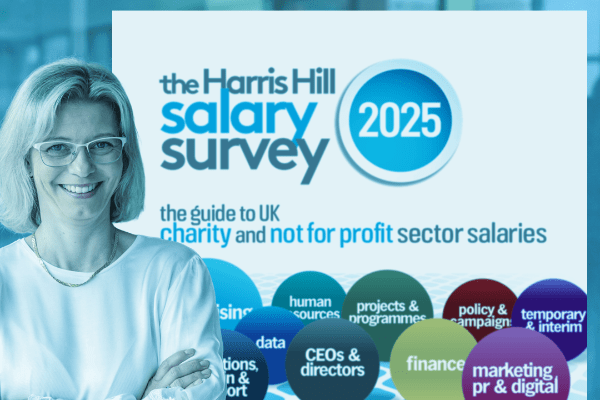Since I steered my career path in a different direction last year, I've been dusting off my CV and dedicating time to reflect on my work experience as I prepare for interviews.
I have over eighteen years' HR experience gained in both charity, commercial and creative environments; a deliberate move to broaden my skill set and although I've enjoyed them all, there have been some notable differences.
For this month's guest article, I'm exploring:
what differentiates working in charity HR from other sectors
the challenges and considerations unique to the not-for-profit (NFP) sector
ideas and tips for charity HR people to improve processes, even on a limited budget
I've also reached out to other HR specialists with experience in both sectors to seek their professional views.

What's different about working in charity HR?
If you asked charity people what their key motivator is, I'm confident the spirited response would be 'passion!'
You only had to be a spectator at the London Marathon 2018, observing a sea of charity running vests, masses of thunderous charity cheering squads and tired but enthusiastic post-race reception volunteers, to feel the sheer force of enthusiasm and personal investment that charity people give to their day jobs.
Back in 2003, I worked for a large engineering firm that offered career progression, a competitive salary and financial support towards my professional qualification. Yet, I had a nagging, unshakeable feeling that something was missing.
It's only when I saw an advert for 'HR Coordinator, Breast Cancer Care' in People Management magazine and immediately scrawled a ring around it (yes, an actual advert...on paper!) that the realisation hit; I was lacking a sense of purpose. I applied, got the job and never looked back.
An HR manager with NFP experience I spoke to - now working in the legal sector - relates to this, explaining: 'It's often a very personal and passionate journey that charity employees go through. By comparison in professional services, employees are equally driven in their roles, but the reason for that drive is not the same kind/depth of passion'.
Additionally, charity HR people may naturally be, or are often required to be, empathetic in their delivery and decision making which can ensure a considered approach and a high degree of integrity. However, this passion can sometimes be an obstacle for charity HR specialists, as supporting key procedures such as restructures, performance management processes and fair dismissals can feel much more difficult.
What are the pros and cons?
One potential 'con' for HR charity specialists (although dependent on type and size of charity) is often money; whether take home salary, budget availability or the justification on how to spend donated funds.
Often, procedures such as recruitment authorisations or L&D expenditures are tightly managed and require careful explanation, and management structures including authorisation from trustees can take some getting used to.
Harris Hill's 2017 Salary Survey (look out for the 2018 edition in just a few days' time! - Ed) reports average salaries for HR managers ranging from £35,000 to £42,000 per annum, depending partly on charity size. This compares with an average of £38,000 to £50,000 per annum in other sectors, so may be a key factor when considering a transition to the charity sector.
However, Danielle Alsey, who moved from a large financial bank with no charity experience and is now HR Business Partner at Cancer Research UK (CRUK) has never looked back. 'I may not receive the (wonderful) annual bonus' she reflected. 'However I LOVE the organisation I work for and now have a lot healthier work-life balance'. Danielle also describes her fierce passion for the success of the charity and how 'immensely proud' she is to work for CRUK.
Common misconceptions
One myth I personally have to dispel, especially since seeking part-time roles outside of the charity sector, is that working in charity HR is easy.
That it's soft and 'fluffy' and the HR issues I managed, the senior managers I partnered with and the pace I worked at during my charity sector experience was less complex or challenging.
This is simply not true. Perhaps because of the passion, personal investment and individual experiences of the cause, it can be even more demanding. I worked with hard-working, creative individuals with incredibly high-expectations and my HR experience was enriched as a result. Danielle agrees, explaining 'to be clear, it is still a very demanding, high-expectation, driven organisation'.
However, a definite 'pro' for working in HR in the charity sector is the potential to achieve a better work-life balance. As our legal sector HR manager points out 'the sector is not known for the same long-hours culture as other sectors' and Danielle has enjoyed CRUK's culture that 'doesn't expect/leave you checking your phone all evening and weekend'.
Finally, although money is important, working in HR for a charity gives you a sense of contributing towards a much bigger goal. You are supporting, training, coaching and developing talented people who are working to change the world or make a difference - and that is hugely rewarding.
What do I need to consider if I want to move into the charity sector?
For those contemplating a career in charity HR from another sector or seeking progression you may want to consider the following:
- Firstly, do the maths; the financial differential can be hard to adjust to at first, although there are many other benefits! Calculate your living and essential costs and then consider areas that may need to be tweaked.
- Our legal contact also advises doing careful homework to find a charity that feels right for you personally rather than just diving in, explaining 'I interviewed with another large charity before my chosen one - but it didn't feel right for me; too haphazard, lacking direction and 'fuzzy'; that was not the right mix for me and would have frustrated me'.
- Larger charities such as CRUK provide multiple options for a career change or entry such as apprenticeships, paid internships as well as entry level roles - and prior charity experience isn't always needed.
- Finally, talk to an experienced consultant at Harris Hill; they're always on hand to provide advice and guidance and update you on any potential openings.
Reaching out to other HR specialists with diverse experiences and reflecting on my own career choices has confirmed there are definite pros and cons to the charity and commercial sectors for those in HR.
Yet, as I stood at the barriers last month watching the London Marathon 2018 and cheering on my brother-in-law and cousin running for two amazing charities; National Deaf Children's Society and Hospice UK, I felt a great sense of pride for having been an HR specialist in the charity sector.
As my legal colleague so eloquently said, working in not-for-profit 'feels real every day - you are living the cause behind the charity and are part of it'.
You are doing work that can potentially change the world.
How wonderful is that?
Nicola Greenbrook, Freelance Writer and HR Professional


Creative ideas for charity HR
If you're already working in HR for a charity, you'll know that budgets are often limited, but this doesn't mean that creativity has to be economised.
Here are three relatively simple and low-cost ways you may able to improve your charity's HR processes.
► Help - and reap the rewards
Be available and willing to share your ideas, policies and time with your networks. As a colleague recently told me 'It's amazing how many favours you can call in/how you can ask people for help if you put in the leg work to help others'.
► Network wisely
Utilise your contacts, professional membership and events well to get advice and ideas about available resources at a reasonable price. I learnt about Charity Days, a group of trainers who volunteer to give their time free of charge to registered charities this way, and it proved invaluable.
► Be creative
Expand your L&D programme with help from your own internal talent; involve key teams in onboarding or ask if they would be willing to training other staff in their own specialist area. Reach out to contacts in other sectors and ask if they are interested in mentoring, running a lunchtime creative session or donating their time to guest speak at a course.
-

Opportunity for all
Find out how we’re working to deliver more diverse, equitable and inclusive recruitment…
-

Recruiting a charity CEO?
Our executive recruitment specialists have an exceptional record of successful CEO, chair, trustee and…
-

Charity sector salaries
Our 2025 Salary Survey has the latest rates and expert insight for roles throughout the sector.













